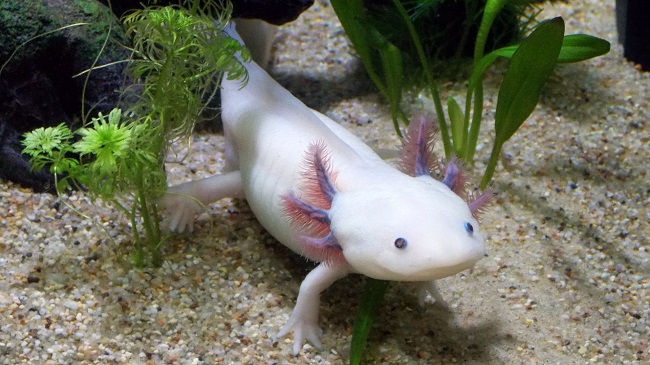Known for their charismatic fringed gills and regenerative abilities, axolotls have garnered significant attention among aquarists and amphibian enthusiasts.
To care for these fascinating creatures properly, one must understand their dietary needs, which leads us to the question, ‘What Do Axolotls Eat?’
This article provides a thorough exploration of an axolotl’s diet, helping you provide balanced nutrition for your unique pet.

Dietary Preferences of Axolotls
As carnivores, axolotls have a predilection for a high-protein diet. They feed on a variety of foods that primarily include:
Live Prey
In the wild, axolotls hunt live prey, which includes small fish, worms, crustaceans, and insect larvae. This behavior is replicated in captivity, where many axolotls display a preference for live food.
Pellets
Specially formulated axolotl pellets provide balanced nutrition and are often a staple in their diet in captivity.
Frozen Food
Axolotls can also consume defrosted frozen food, such as bloodworms and brine shrimp, which are rich in nutrients.
Occasional Treats
Treats like cooked chicken or beef, while not a regular part of their diet, can occasionally be offered.
Feeding Habits of Axolotls
Understanding ‘What Do Axolotls Eat’ isn’t just about knowing their preferred food types, but also their feeding habits:
Frequency
Young axolotls need to eat daily due to their rapid growth, while adults can be fed every other day or three times a week.
Amount
As a general rule, an axolotl’s daily food portion should not exceed the size of its head.
Feeding Time
Being naturally nocturnal, axolotls tend to be most active during the evening and night, making it the optimal feeding time.
Eating Style
Axolotls gulp their food whole, using a vacuum-like suction technique, which means food items should be size-appropriate to prevent choking.
Considerations for Feeding Axolotls
There are a few important points to keep in mind to ensure your axolotl’s health:
Balanced Diet
Ensure your axolotl gets a mix of different food items for a balanced diet.
Avoid Certain Foods
Some foods, like raw meat or fish, commercial fish food, or small gravel, can harm your axolotl and should be avoided.
Monitor Their Weight
Overfeeding can lead to obesity, which is harmful to axolotls. Regularly check your axolotl’s body condition and adjust feedings accordingly.
Clean the Tank Regularly
Uneaten food can decay and harm water quality. Remove any leftover food promptly and keep the tank clean.
Conclusion
Understanding ‘What Do Axolotls Eat’ is a crucial aspect of axolotl care, ensuring they receive the nutrients they need for optimal health. Whether it’s live prey, pellets, or frozen food, a balanced, varied diet is key.
With proper feeding habits and careful monitoring, you can contribute to the well-being and longevity of your axolotl. This fascinating creature, with its unique needs, certainly promises an enriching pet ownership experience.
























